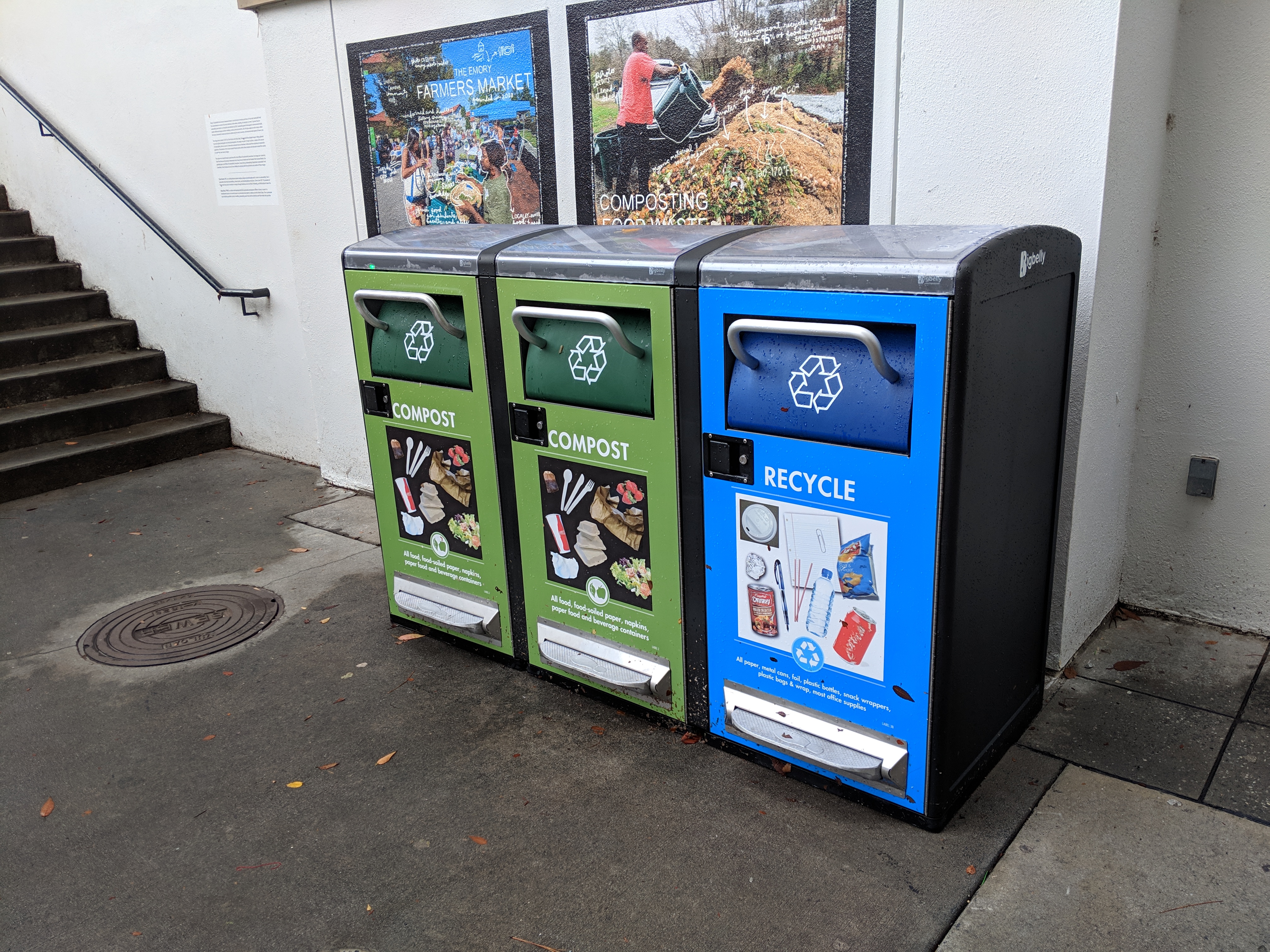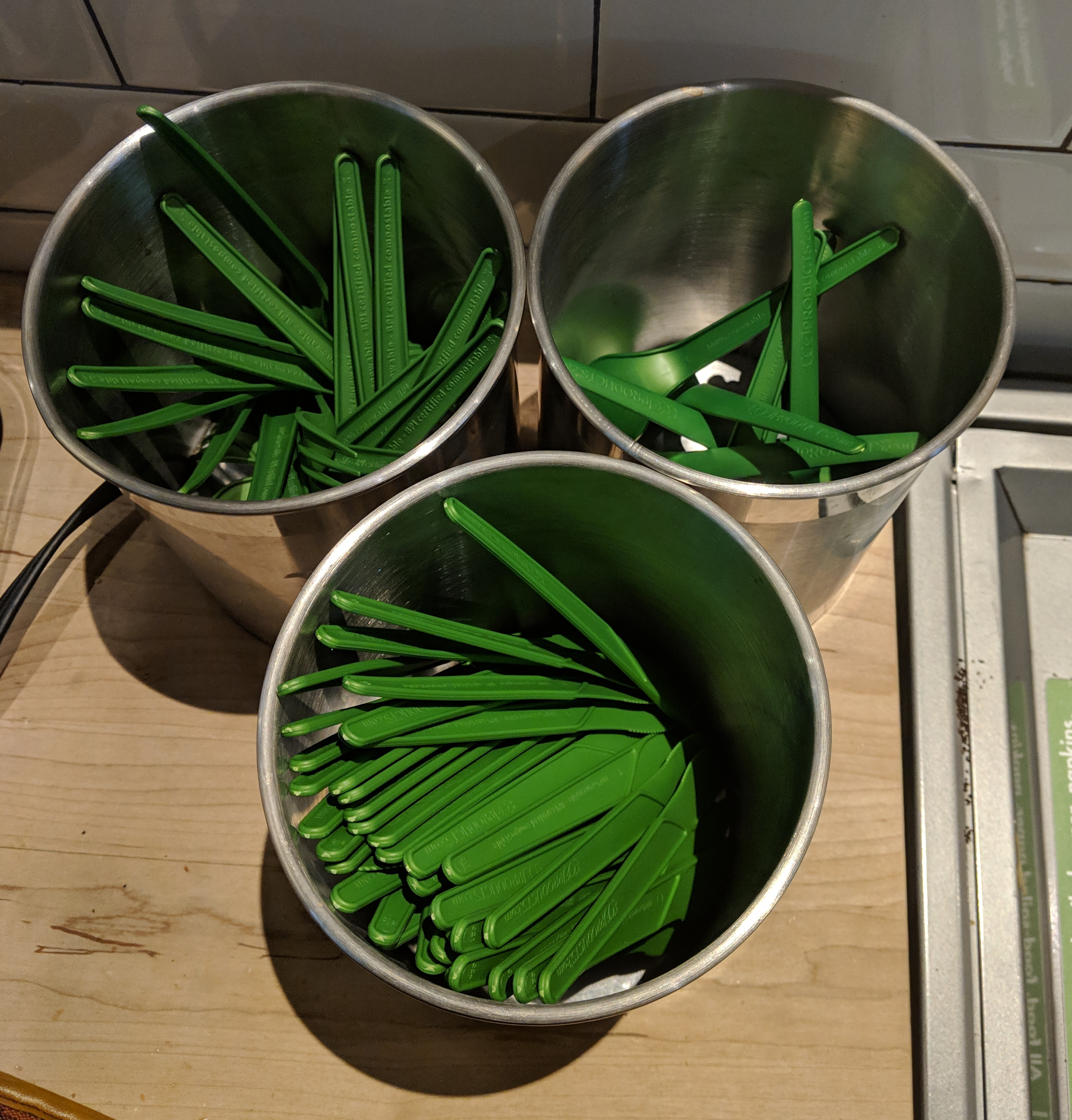By: Katelyn Boisvert Intern, Office of Sustainability Initiatives
 With the introduction of Emory’s new Waste Policy in January of this year, Emory Dining plays a very important role in helping the University achieve its goal to divert 95% of all waste from landfills by 2025. Emory Dining has recently implemented a number of waste reduction and diversion programs including: the use of green compostable cutlery at all Dining locations, the installation of Big Belly solar waste compactors outside of Cox Hall, a reusable to-go container pilot program, and the Last Straw Initiative.
With the introduction of Emory’s new Waste Policy in January of this year, Emory Dining plays a very important role in helping the University achieve its goal to divert 95% of all waste from landfills by 2025. Emory Dining has recently implemented a number of waste reduction and diversion programs including: the use of green compostable cutlery at all Dining locations, the installation of Big Belly solar waste compactors outside of Cox Hall, a reusable to-go container pilot program, and the Last Straw Initiative.
Chad Sunstein, the Director of Campus Dining at Emory, acknowledges the need for Dining’s waste reduction and diversion efforts. “Dining is one of the larger waste producers on campus,” Sunstein said. “So the steps we take have a significant impact on reduction and diversion.” He also stressed how Dining often serves as a pilot for programs that can later be expanded to other areas of campus.
 The idea for using green compostable cutlery emerged when it was recognized that the previous utensils were not easily identified as compostable by Emory’s compost vendor and were often mistaken for plastic utensils and removed to be recycled instead of being composted. Green cutlery is more user-friendly because it matches the coloration of compost bins around campus and is composted at higher rates by Emory’s vendor than the old utensil style.
The idea for using green compostable cutlery emerged when it was recognized that the previous utensils were not easily identified as compostable by Emory’s compost vendor and were often mistaken for plastic utensils and removed to be recycled instead of being composted. Green cutlery is more user-friendly because it matches the coloration of compost bins around campus and is composted at higher rates by Emory’s vendor than the old utensil style.
Big Belly solar waste compactors were introduced on the Cox Hall patio in October to address the need for managing high volumes of compost originating from Cox Hall, especially during lunch hours. Volume control has improved for all of Cox Hall since these units were installed, the bins do not have to be emptied as often, and fewer bags are used to line the containers. The compactors have solar panels on their tops, which collect the energy to run the automatic compacting that occurs as the bins fill up. Additionally, the bins provide real-time data that alerts the Building & Residential Services staff when the bins need to be serviced.
The Emory Dining team also tries to reduce waste from Cox Hall overall. The Eco-Takeout Container pilot program allows students, faculty and staff to opt-in to a program which provides reusable takeout containers for use when purchasing food at certain vendors in Cox Hall. Members of the program receive a token upon joining that they exchange for a container. Members receive a new token when they return their used container to Cox, and the process repeats. This pilot program, which will last for the remainder of the semester, has already seen engagement by students, staff and faculty and will allow up to 100 program members to avoid the use of disposable takeout containers.
Emory Dining has also taken note of the global concerns about plastic straws ending up in aquatic ecosystems and harming wildlife. In October, Dining launched the Last Straw Initiative and now only offers straws upon request. Straws provided are biodegradable paper, with a small reserve of plastic straws available for those with disability or access needs. This program will help raise awareness of waste reduction, and is an important step toward the University moving away from single-use disposables.

I hope you can soon include Emory Healthcare in your composting plan. There is an enormous amount of food container waste generated every day in the Hospital and Clinics!